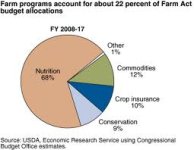The government is subject, of course, to congressman needing votes, politics, lobbying and all that sort of thing. But, there is also an aspect of national defense, economic stability and "too big to fail" here as well. Farm land and farmers are not quite like other industries. The rock pile that forms the policies of the US government in agriculture and agribusiness are the result of decades of stone upon stone. It wasn't done overnight.
The government wants some stability in prices, even if that means some manipulation through subsidies. It doesn't want farmers going from boom and bust. Some history lessons learned from the late 1800s and early 1900s with horrible swings of pricing, land values and speculation based on weather conditions and crop disease.
One could say there is an element of central planning in all this. Would a total free market approach be better over the long haul? To be decided, I guess.

